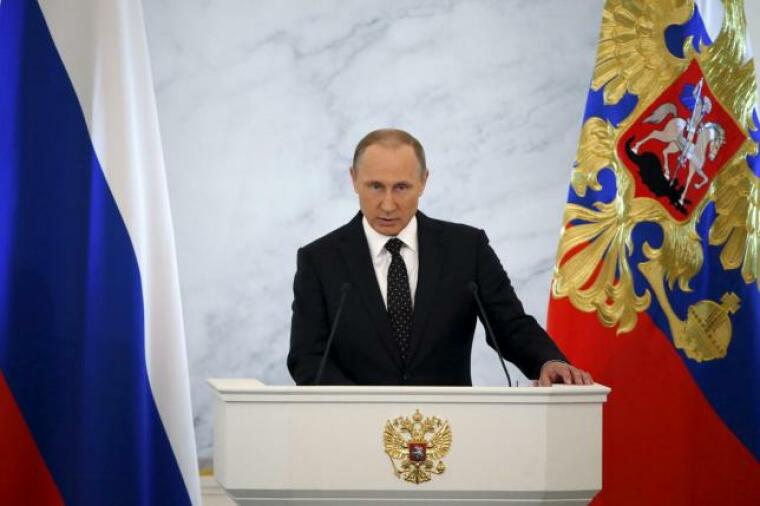Edward Snowden: A 'Dark Day for Russia' as Putin passes 'Big Brother law'
American whistleblower Edward Snowden called it a "dark day for Russia" when Russian President Vladimir Putin signed into law what Snowden also dubbed as the "Big Brother law."

The former National Security Agency employee, who lives in an undisclosed location in Russia after receiving asylum three years ago, took to Twitter on Thursday, July 7 to criticize the announcement made earlier that day that Putin passed into law the controversial anti-terrorism bill.
"#Putin has signed a repressive new law that violates not only human rights, but common sense. Dark day for #Russia," wrote Snowden.
The law, which Snowden also earlier dubbed as the "Big Brother law," makes it a crime to commit any act that may be perceived as inciting or expressing an approval of terrorism online as well as mere discussions of public demonstrations. It also obliges telecommunication providers to store records for six months and requires messaging services such as Facebook and Telegram to provide decryption keys to state authorities.
The new law also prohibits preaching, evangelizing, and distribution of religious materials outside one's home that could be penalized for up to $15,000. Churches are also restricted on their contact with foreign missionaries.
United States Commission on International Religious Freedom (USCIRF) issued a press release Friday to condemn the passing of the anti-terrorism bill which USCIRF said only took on "under the guise of confronting terrorism" to suppress religious and civil liberties. USCIRF believes the law targets religious communities such as experienced by Muslims and Jehovah's Witnesses as the country identifies extremism including religious acts of advocating "the superiority of one's own religion."
"The law has been passed along with a list of recommendations to the government designed to minimize potential financial risks," Putin's spokesman Dmitry Peskov told journalists, as reported by The Moscow Times.
"If the law produces any undesired outcomes, the government will introduce measures accordingly by presidential decree," added Peskov.
Also known as the "Yarovaya law" after its chief proponent, ultra-conservative lawmaker Irina Yarovaya, the new law will take effect July 20.
 Christians don't have to affirm transgenderism, but they can’t express that view at work: tribunal
Christians don't have to affirm transgenderism, but they can’t express that view at work: tribunal Archaeology discovery: Medieval Christian prayer beads found on Holy Island
Archaeology discovery: Medieval Christian prayer beads found on Holy Island Presbyterian Church in America votes to leave National Association of Evangelicals
Presbyterian Church in America votes to leave National Association of Evangelicals Over 50 killed in 'vile and satanic' attack at Nigerian church on Pentecost Sunday
Over 50 killed in 'vile and satanic' attack at Nigerian church on Pentecost Sunday Ukrainian Orthodox Church severs ties with Moscow over Patriarch Kirill's support for Putin's war
Ukrainian Orthodox Church severs ties with Moscow over Patriarch Kirill's support for Putin's war Islamic State kills 20 Nigerian Christians as revenge for US airstrike
Islamic State kills 20 Nigerian Christians as revenge for US airstrike Man who served 33 years in prison for murder leads inmates to Christ
Man who served 33 years in prison for murder leads inmates to Christ


 Nigerian student beaten to death, body burned over ‘blasphemous’ WhatsApp message
Nigerian student beaten to death, body burned over ‘blasphemous’ WhatsApp message 'A new low': World reacts after Hong Kong arrests 90-year-old Cardinal Joseph Zen
'A new low': World reacts after Hong Kong arrests 90-year-old Cardinal Joseph Zen Iran sentences Christian man to 10 years in prison for hosting house church worship gathering
Iran sentences Christian man to 10 years in prison for hosting house church worship gathering French Guyana: Pastor shot dead, church set on fire after meeting delegation of Evangelicals
French Guyana: Pastor shot dead, church set on fire after meeting delegation of Evangelicals ‘Talking Jesus’ report finds only 6% of UK adults identify as practicing Christians
‘Talking Jesus’ report finds only 6% of UK adults identify as practicing Christians Mission Eurasia ministry center blown up in Ukraine, hundreds of Bibles destroyed: 'God will provide'
Mission Eurasia ministry center blown up in Ukraine, hundreds of Bibles destroyed: 'God will provide' Church holds service for first time after ISIS desecrated it 8 years ago
Church holds service for first time after ISIS desecrated it 8 years ago Burger King apologizes for 'offensive campaign' using Jesus' words at the Last Supper
Burger King apologizes for 'offensive campaign' using Jesus' words at the Last Supper Uganda: Muslims abduct teacher, burn him inside mosque for praying in Christ’s name
Uganda: Muslims abduct teacher, burn him inside mosque for praying in Christ’s name